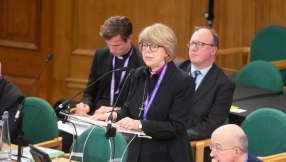Brown says he is 'sticking to the job'
While he is on a three-day tour of the United States, Brown's poll ratings have fallen sharply at home and there is a growing sense of a government under siege as Britons fret about their well-being because of falling home prices and a slowing economy as a global credit crunch takes its toll.
The Labour Party, in power for more than a decade, is facing a drubbing in local elections on May 1, raising speculation he might face a challenge for the leadership before the next national election, which must take place by 2010.
"I'm sticking to the job and I'm getting on with the job," Brown said, brushing aside a question on his problems at home at a White House news conference with President George W. Bush.
Worried about their own future, many Labour lawmakers are unhappy with Brown's decision last year to abolish a 10 percent tax rate that benefited low earners in order to make a cut in the main rate of tax from 22 percent to 20 percent.
A Labour member of the House of Lords led the attack on Thursday. He was quoted as saying in a newspaper interview that senior members of the government were now turning their minds to who can replace Brown, who took over from Tony Blair last June after a decade as Chancellor.
Then Angela Smith, a junior member of Brown's government, was reported to have quit, only to say later she had talked to the prime minister and was not resigning after all.
Adding to Brown's woes, veteran Labour MP Gwyneth Dunwoody - the longest-serving female member of parliament - was reported late on Thursday to have died, which will force a by-election.
Asked about anger over the abolition of the 10 percent tax rate, Brown made it clear he was not about to roll back.
"My answer to people who say what is happening domestically is that we are taking the right long-term decisions for the British economy," he said. "We will see these long-term changes through and these are the right long-term changes for the British people.
Brown said the changes were part of a major reform of the tax system which had also brought down the headline tax rate for millions of people and that there had been offsetting allowances and credits for people on low incomes hit by the abolition of the lower rate.
GLOBAL PROBLEM
Fears of a housing crash have shot up over the past month after one survey showed prices falling at their fastest monthly rate since the 1992 recession, when hundreds of thousands lost their homes as they became unable to pay their mortgage bills.
The government has put a brave face on the decline, arguing it needs to be put in the context of prices more than doubling over the last decade, but is clearly rattled and calling for lenders to pass on interest rate cuts to their customers.
Brown called in senior financiers in London earlier this week and then met Wall Street executives in New York on Wednesday to see what could be done to end the funding squeeze that is putting pressure on prospective homeowners and existing ones who need to refinance their loans.
The prime minister said the market turmoil had also been a big feature of his talks with Bush. "Both Britain and America are taking steps to help homeowners, " he said.
Brown will meet Federal Reserve Chairman Ben Bernanke early on Friday before flying to Boston to deliver a speech on reform of international institutions.
"What matters to me is that people feel safe and secure about the future, about their prospects, and about their jobs. And that's why we will not hesitate to take any action that is necessary to keep the economy moving forward," he said.
British authorities are working on a plan to break the lending squeeze which could be announced as early as next week, a source close to the situation told Reuters in London on Thursday.













